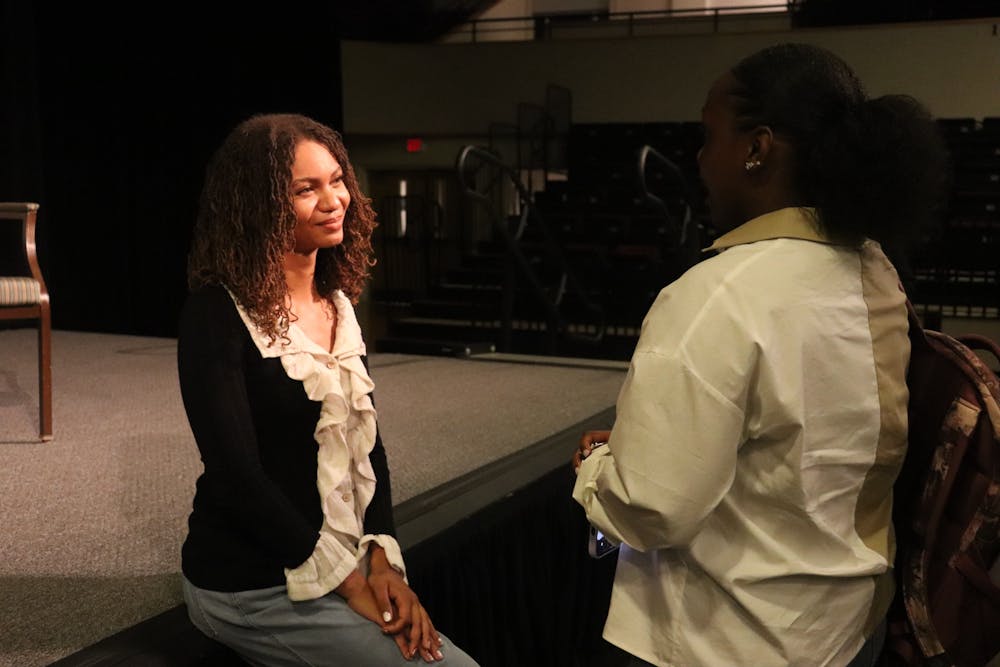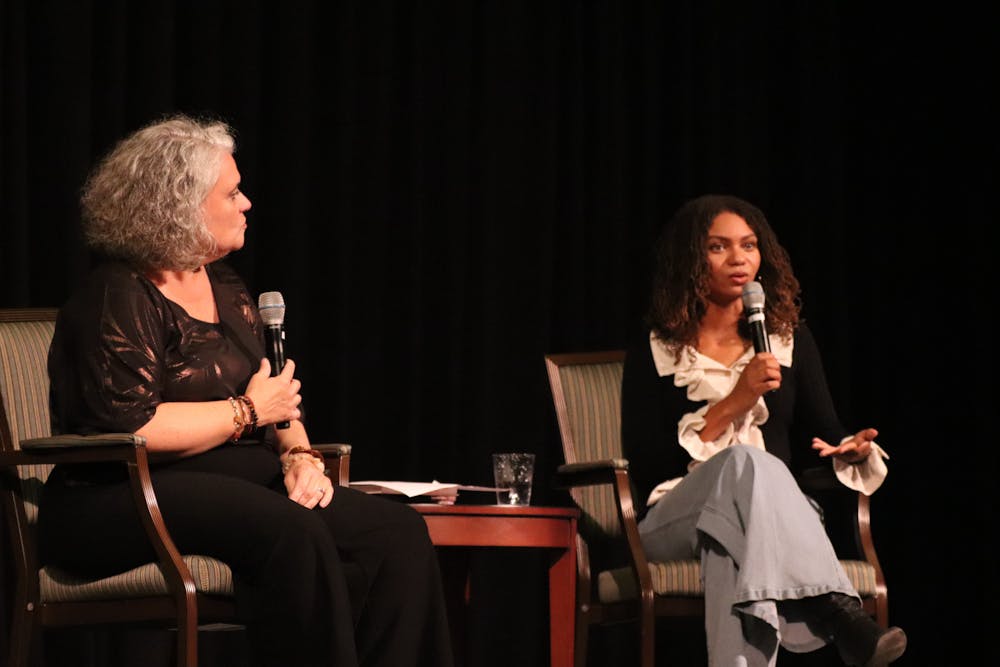Leah Thomas, author of Elon University’s 2024 common reading book, “The Intersectional Environmentalist: How to Dismantle Systems of Oppression to Protect People + Planet,” spoke Sept. 19 in Alumni Gym as a part of Elon University’s speaker series.
As the author of the 2024 common reading book, which analyzes how environmentalism and social injustices intersect, Thomas spoke to the audience about her decision to delve into environmental communications and what inspired her to write her book.
“I realized the environmental movement had a really big communications problem,” Thomas said during the event. “There were a lot of people who didn't know what was going on in their community, or when they thought about environmentalism they just thought it was something that would shame them for using plastic straws.”
Thomas said the desire to change environmental communications led her to corporate environmentalism and working at Patagonia, a U.S. company that sells clothes, food and outdoor equipment with a focus on environmentalism and sustainability.
“It's essentially a utopia,” Thomas said. “Everybody's walking around with Birkenstocks. Everybody surfs before work. I thought I was going to be there forever.”
However, that changed when the COVID-19 pandemic and the racial justice movement of 2020 happened. Thomas recalled how her peers were shrugging their shoulders about the movement and how they thought it wasn’t their place to get involved as environmentalists.
“I didn't want to be a part of any type of environmental movement that did not prioritize human rights and the lives of all people,” Thomas said.
Thomas said she decided to leave Patagonia and started working on her book.
“I wanted to educate the environmental community and more people about the intersections of climate and culture,” Thomas said. “We can't save the planet without uplifting the voices of its people, especially those most often unheard.”

Following her speech, Thomas participated in a Q&A with Paula Patch, associate director for first-year initiatives in the Elon core curriculum and chair of the common reading selection committee, with questions submitted by the class of 2028. Patch said intersectional environmentalism can be found throughout Elon and North Carolina, including hog farming in Duplin county.
“Hog farming, which North Carolina is known for, creates an environmental impact because the hog waste goes into hog lagoons,” Patch said during the event. “The products we don't eat from hog farming are shared with other communities in ways that degrade water quality, air quality, and therefore quality of life.”
Patch also talked about the Haw River, which runs through Alamance county, and its history of pollution.
“In your literal backyard here at Elon, the Haw River used to be purple,” Patch said. “Lots of times it was purple and blue from the dyes that were being used in the textile mills, an industry that rely on the water power to operate.”
Patch told Elon News Network that the student response to Thomas’ book and the event has been positive. Over the summer the incoming freshmen class have access to a Moodle page that Patch facilitates where students can ask questions about the book. According to Patch, there have been around 1,000 responses from the class of 2028 about Thomas’ book.
“I think what's been really helpful is that they really connect with her,” Patch said. “There's something they can connect to and that's been really helpful. “Whether it's her tone, her vibe, I think that's what we saw tonight.”
Freshman Kennedy Cawley said she liked how Thomas’ own journey affected her idea of intersectional environmentalism.
“It was really interesting to see how her story contributed to the importance of intersectional environmentalism,” Cawley said. “She had just such niche experiences that no one else would have thought of and it really just contributed a lot.”
Freshman Rachel Rabe, who lives in the Outdoor Learning Community, said she hopes Elon starts to get more involved in intersectional environmentalism.
“I'd like to see us go out and clean up some of the pollution, especially in the Haw River,” Rabe said. “I think it would be good to incorporate that into our hikes.”
Thomas ended the event encouraging students to support those outside of their own communities by listening and asking others what they need.
“I don't know how many times I've gone into a situation thinking I know the answer to this thing without talking to people that might actually be impacted by it,” Thomas said. “The best question is, ‘How can I help?’ especially for communities that are perhaps marginalized,”
The next event in the speaker series will be Fall Convocation with Arthur C. Brooks, a professor of the practice of public and nonprofit leadership at the Harvard Kennedy School and professor of management practice at the Harvard Business School, where he teaches courses about leadership and happiness. Brooks will be speaking at 3:30 p.m. Sept. 27 in Alumni Gym.
Tickets are $15 or free with an Elon ID and can be purchased on Elon’s ticketing website.


